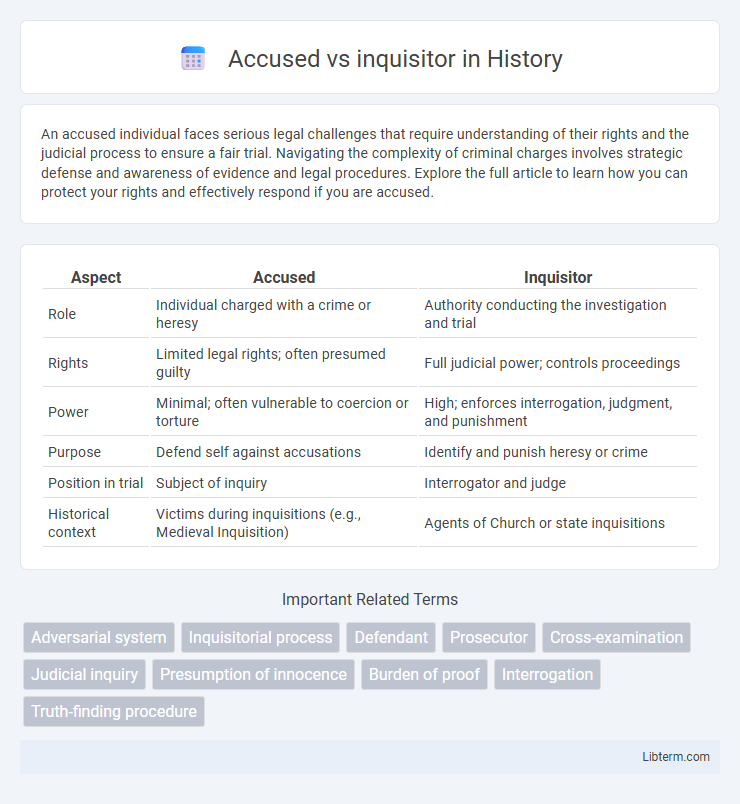An accused individual faces serious legal challenges that require understanding of their rights and the judicial process to ensure a fair trial. Navigating the complexity of criminal charges involves strategic defense and awareness of evidence and legal procedures. Explore the full article to learn how you can protect your rights and effectively respond if you are accused.
Table of Comparison
| Aspect | Accused | Inquisitor |
|---|---|---|
| Role | Individual charged with a crime or heresy | Authority conducting the investigation and trial |
| Rights | Limited legal rights; often presumed guilty | Full judicial power; controls proceedings |
| Power | Minimal; often vulnerable to coercion or torture | High; enforces interrogation, judgment, and punishment |
| Purpose | Defend self against accusations | Identify and punish heresy or crime |
| Position in trial | Subject of inquiry | Interrogator and judge |
| Historical context | Victims during inquisitions (e.g., Medieval Inquisition) | Agents of Church or state inquisitions |
Understanding the Accused: Definition and Role
The accused refers to an individual formally charged with a crime or wrongdoing, central to criminal and legal proceedings. Understanding the accused involves recognizing their rights, the presumption of innocence, and their role in presenting a defense within judicial systems. This distinction is critical in differentiating the accused from the inquisitor, who conducts investigations and seeks evidence.
Who Is the Inquisitor? Meaning and Historical Context
The inquisitor was an official appointed by the Catholic Church during the medieval and early modern periods to investigate and prosecute heresy, empowered to interrogate and judge accused individuals within ecclesiastical courts. Originating from the Latin term "inquirere," meaning "to investigate," inquisitors played a central role in the Inquisition, a system designed to enforce doctrinal conformity and suppress dissent. Their authority extended beyond mere questioning, often involving the use of torture and severe punishments to extract confessions, reflecting the church's efforts to maintain religious orthodoxy and political control across Europe.
Key Differences Between Accused and Inquisitor
The accused is the individual who faces allegations or charges in a legal or investigative process, while the inquisitor is the person conducting the examination or interrogation. The accused must respond to accusations and defend themselves, whereas the inquisitor's role is to gather facts, question the accused, and seek the truth. These roles differ fundamentally in responsibility: the accused is subject to scrutiny, and the inquisitor acts as the authority or investigator ensuring due process.
Historical Origins of the Accused vs Inquisitor Dynamic
The dynamic between the accused and the inquisitor traces back to medieval judicial systems, particularly the Inquisition established by the Catholic Church in the 12th century. Inquisitors held authoritative power to investigate, interrogate, and prosecute individuals suspected of heresy, often operating with minimal safeguards for the accused. This asymmetrical relationship laid the foundation for modern legal principles emphasizing due process and the rights of the accused in criminal justice.
Legal Perspectives on Accuser and Inquisitor Roles
Legal perspectives distinguish the accused, who possesses the right to defense and presumption of innocence, from the inquisitor, typically an official or judge responsible for investigating and presenting evidence. The accuser initiates the complaint or prosecution, whereas the inquisitor conducts impartial fact-finding, often in inquisitorial legal systems where the court actively examines evidence. Balancing these roles ensures procedural fairness, protects defendant rights, and upholds the integrity of judicial proceedings.
Psychological Impact on the Accused
The psychological impact on the accused during inquisitorial proceedings often includes heightened anxiety, feelings of helplessness, and a pervasive sense of distrust toward authority figures. Continuous interrogation and the pressure to confess can lead to severe emotional distress and long-lasting trauma. These psychological effects may compromise the accused's ability to mount a coherent defense and can result in false confessions or mental health deterioration.
The Inquisitor’s Authority and Responsibilities
The Inquisitor holds supreme authority in investigating and prosecuting cases of heresy, wielding power to interrogate, detain, and pass judgment on the accused. Responsibilities include gathering evidence, overseeing trials, and ensuring adherence to doctrinal purity within religious or judicial contexts. This role demands impartiality and thoroughness to maintain order and enforce ecclesiastical law effectively.
Accused vs Inquisitor in Modern Justice Systems
The dynamic between the accused and the inquisitor in modern justice systems emphasizes the protection of individual rights and the presumption of innocence, contrasting sharply with historical inquisitorial methods that often prioritized state power and confession extraction. Contemporary legal frameworks incorporate impartial judges and defense counsel to ensure fair trials, minimizing biases that characterized inquisitorial proceedings. Emphasizing transparency, evidence-based adjudication, and procedural safeguards, modern systems strive to balance state interests with the accused's constitutional protections.
Famous Cases Featuring Accused and Inquisitor Conflicts
Famous cases featuring conflicts between the accused and inquisitors often highlight the tension between justice and power, such as the Salem witch trials where accused individuals faced aggressive scrutiny from religious inquisitors. The trial of Galileo Galilei exemplifies the clash between scientific inquiry and inquisitorial authority, with Galileo accused of heresy by the Roman Catholic Church's inquisitors. These cases underscore the dangers of biased interrogations and the critical importance of fair legal procedures in safeguarding the rights of the accused.
Balancing Rights: Protecting Both Accused and Inquisitor
Balancing rights between the accused and the inquisitor requires ensuring fair treatment while safeguarding due process and impartial investigation. Legal systems implement procedural safeguards, such as presumption of innocence and transparent evidence evaluation, to protect the accused from wrongful conviction. Simultaneously, protecting inquisitors involves granting authority to conduct thorough inquiries without fear of undue interference or retaliation, maintaining the integrity of judicial or investigatory processes.
Accused Infographic

 libterm.com
libterm.com